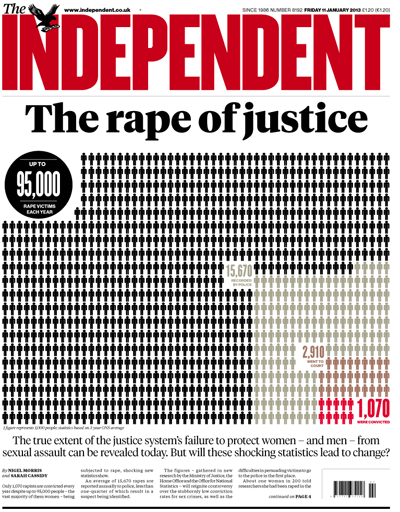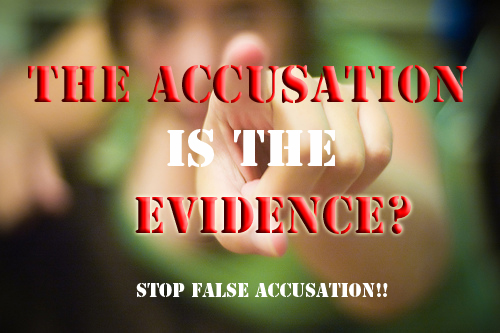Today, the easiest way to get rid of a rival, whether in politics, business or wherever, is to trap him in a well planned and executed fake case. To be honest, it is nothing new and it happens all the time. The earliest such recorded instance might be that of Joseph, the Biblical character we find in the book of Genesis. Even today, we find many Josephs' getting trapped with no way out in fake accusations.
 |
| Source: Google |
|
| But, the story takes a different turn when it comes to fake accusations of rape attempts. The problem is that, in such cases, the defendant is heavily protected by law. It is extremely difficult to know if the accusation is false, because, if the accusation is false, then it will usually be a well planned one. The trial the accused and his family undergo from the media, civil right groups, friends, co-workers etc can be imagined. And, sadly, the dirt sticks. |
Studies have shown that 10- 20% of all rape accusations are false and are aimed at seeking revenge In fact, since the Delhi Case last year, there has been a lot of awareness on this issue, and rightly so. The moment such accusations reach the public, there will be a huge outrage with everyone crying for blood of the accused. To make matters worse, the law is strongly biased against the accused in these incidents on the assumption that there won’t be any false accusations. Even in the courtroom, because of the sensitivity of the issue, the prosecution is required to prove that it is more likely to have happened; it need not prove that it has happened beyond any reasonable degree of doubt. Cases like these also adversely affect the protection and response the real victims receive because the police might become a bit hesitant to help them, being unsure if the accusation is true or not.
 |
Jose Thettayil
Source: Google |
There have been several recent cases of such false allegations, with politicians like Mr. Jose Thettayil etc getting caught in it. The point I am making is not regarding the morality of his actions. But, the girl sent those videotapes to all media houses and asked them to make some news out of it. Naturally, they obliged. Later, it turned out that the accusation was baseless, but not before tarnishing his reputation beyond repair. One might argue that he deserved it, but will that justify the irresponsibility shown by the media?
Today, Mr. Tarun Tejpal finds himself in the mix of things. The allegation by the Tehelka journalist might be true, given the initial response Mr. Tejpal gave on the issue to Mrs. Shoma, the former Managing Editor of Tehelka. But, who can say that for certain? If it is false, then Tarun will find himself in an even more precarious situation than Mr. Jose Thettayil was in, because, political parties who were at the receiving end of his sting operations are likely to return the favour.
Following the Nirbhaya incident, there has been a huge increase in the number of false rape cases reported leading everyone to label Delhi as the ‘Rape Capital’. It is because people only check the number of rape cases reported, and not the number of acquittals. I am not saying that India is a safe haven for women and girls. Conditions should definitely be improved. A lot more has to be done in that regard. But, these false cases act as a hindrance and are a major obstacle in our efforts.
 In a verdict given on one such false rape case when a 75 year old man was alleged to have sexually abused a maid in her 30’s, the Delhi High Court said things have come to such a pass after the Nirbhaya gang rape in December that the mere statement of a woman about rape is taken as gospel truth, the accused arrested and charge-sheeted. "This led to an unprecedented surge in filing of false rape cases... It is these false cases which play havoc with the crime statistics, leading to the labelling of Delhi as a rape capital," additional sessions judge Mr. Virender Bhat observed while acquitting the accused.
In a verdict given on one such false rape case when a 75 year old man was alleged to have sexually abused a maid in her 30’s, the Delhi High Court said things have come to such a pass after the Nirbhaya gang rape in December that the mere statement of a woman about rape is taken as gospel truth, the accused arrested and charge-sheeted. "This led to an unprecedented surge in filing of false rape cases... It is these false cases which play havoc with the crime statistics, leading to the labelling of Delhi as a rape capital," additional sessions judge Mr. Virender Bhat observed while acquitting the accused.
Expressing the need for courts to be empowered to award compensation to false rape case victims, the judge also lamented that the media turn a blind eye to acquittals in such cases because "nobody bothers to see in how many cases the accused are convicted. The acquittal of an accused is not noticed at all and he continues to be labelled a 'rapist' even after his honourable acquittal."
There are different reasons why such false accusations are made. It can be made for financial gain, to destroy a political or business opponent, to seek vengeance and at times, even to get on newspapers. There are other instances too. For example, it is a common phenomenon during divorce cases in the western countries where women accuse their husband of abusing their child so that she will have the right to the child’s custody. The reasons may vary. But, the effect it has on the accused will always be understated.
 |
| Tarun Tejpal |
In another verdict in September this year, Judge Nivedita Anil Sharma said, “It is time that we, as a civil society stand up not to only protect, shelter and rehabilitate a victim of rape but also to protect and shelter an accused against whom false allegations of rape have been levelled.”
There are instances like these happening every time. Almost every day, we see the headline, “MAN ACCUSED OF RAPING”, that too, often in the front page. Later, the person may be acquitted by the court. But, that news surprisingly never reaches the media. It is amazing, really. Sensationalism at its peak!
Cases like these are hard for the accused to prove his innocence. It often takes a lot of luck to escape. In one case in the US, the accused escaped because of a voice recording mobile phone application which he had accidentally switched on during the time frame when the incident was alleged to have occurred.
A few days ago, four were held in Jalandhar, in India, for implicating a businessman in a fake rape case. But, he escaped because of a minor mistake a key witness made in his testimony. The witness who was a taxi driver had told the police that he was coming from a place X to Y when he found the victim. The police later found that the statement was false. Sometimes, the victim herself admits to cooking up the whole story. But, not everyone is lucky. Often, the court would have found the accused to be guilty before the true story emerges.
 |
| Source: Google |
So, what can be done to prevent such cases? I don’t think much can be done about the allegations apart from increasing the punishment for wrongful allegations. But, I do feel that many things can be done to help the accused ease back into normal life, if the accusation turns out to be baseless. For that, certain stringent measures need to be taken.
The fourth estate is the one area where much can be done, because, the news of accusations reach the public through the media. Similarly, media can provide equal coverage for the acquittal as it did during the time of accusation. It would be great if organizations like the Editors guild and the Indian Broadcasting Foundation made it a rule to provide equal priority to the acquittals.
There are other areas too, where we can do something to help the falsely accused. We take all possible measures to protect the identity of the victim in these incidents. Why? It is because of the potential harassment and psychological trauma that the victim might undergo. But, doesn’t the same logic apply to the accused as well? If the allegations are false, can anything ever condone for the negative publicity that the accused has been subjected to? Wouldn’t the accused be in a greater trauma and facing graver repercussions in such cases? So, isn’t it better that everyone, including the government and the media houses apply the same rules to the accused as well.
I feel that, perhaps, it would be better for all to exercise restraint and caution in revealing the identity of the accused until the allegations are confirmed to be true. That might well be the least that we can do to help the falsely accused ease back into normal life. I believe that the magnitude of these incidents and the potential damage that they can cause are such that, they need to be treated with a much greater care.
As the cliché’ goes, the accused is innocent, until proven guilty. So, he has the rights that every innocent man has. The victim has the right to privacy and to be protected, so does the accused.
 |
| Source: Google |
(Update: A Study by The Hindu explains my point with detailed evidence. The link is given below)





















